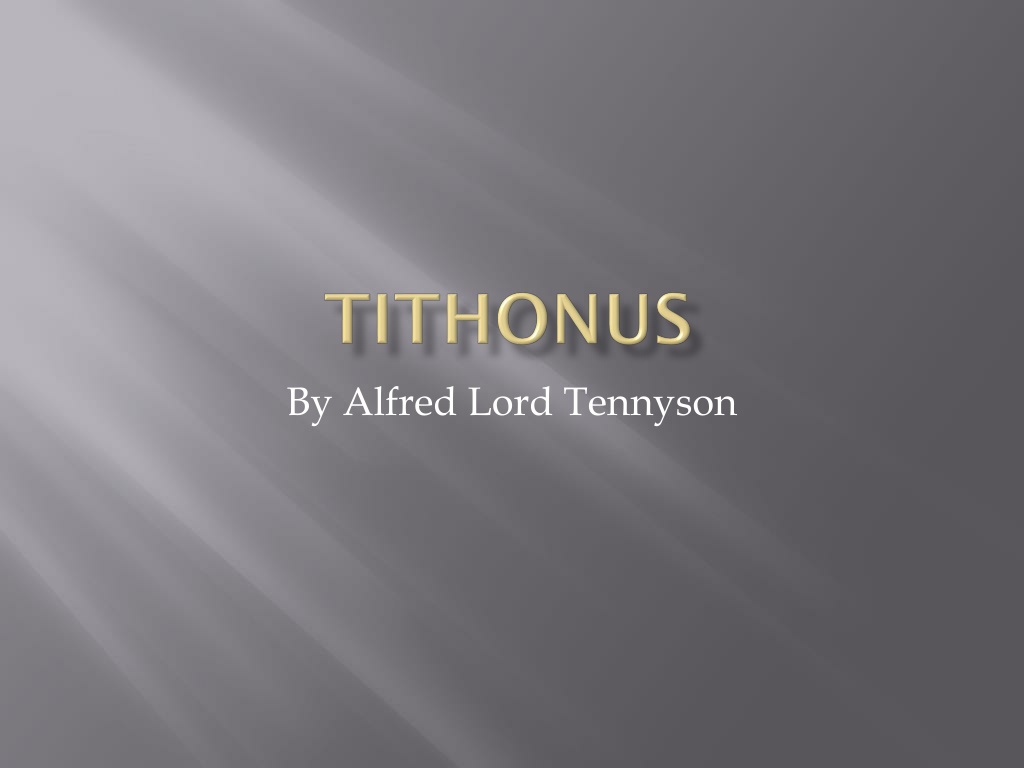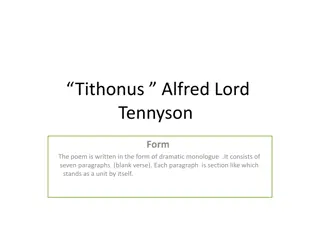
Tennyson's Tithonus: A Mythological Exploration
Delve into Alfred Lord Tennyson's poem "Tithonus," where he reimagines the Greek myth of Tithonus and explores themes of immortality, aging, and the acceptance of death. Contrasting with his work "Ulysses," Tennyson's "Tithonus" offers a poignant reflection on the human experience through the lens of myth and legend.
Download Presentation

Please find below an Image/Link to download the presentation.
The content on the website is provided AS IS for your information and personal use only. It may not be sold, licensed, or shared on other websites without obtaining consent from the author. If you encounter any issues during the download, it is possible that the publisher has removed the file from their server.
You are allowed to download the files provided on this website for personal or commercial use, subject to the condition that they are used lawfully. All files are the property of their respective owners.
The content on the website is provided AS IS for your information and personal use only. It may not be sold, licensed, or shared on other websites without obtaining consent from the author.
E N D
Presentation Transcript
Like Ulysses, Tithonus is a figure from Greek mythology whom Tennyson takes as a speaker in one of his dramatic monologues. According to myth, Tithonus is the brother of Priam, King of Troy, and was loved by Aurora, the immortal goddess of the dawn, who had a habit of carrying off the beautiful young men whom she fancied. Aurora abducted Tithonus and asked Zeus to grant him immortality, which Zeus did. However, she forgot to ask that he also grants eternal youth, so Tithonus soon became a decrepit old man who could not die. Aurora finally transformed him into a grasshopper to relieve him of his sad existence. In this poem, Tennyson slightly alters the mythological story: here, it is Tithonus, not Aurora, who asks for immortality, and it is Aurora, not Zeus, who confers this gift upon him. The source of suffering in the poem is not Aurora s forgetfulness in formulating her request to Zeus, but rather the goddesses referred to as strong Hours who resent Tithonus s immortality and subject him to the ravages of time.
The 1833 poem was initially conceived as a pendant, or companion poem, to Ulysses. Ulysses alludes to the danger that fulfillment may bring It may be that the gulfs will wash us down ; Tithonus represents the realization of this danger for the character of Tithonus achieves that which Ulysses longs for and finds himself bitterly disappointed. Ulysses wanted to sail beyond the sunset because he sensed how dull it is to pause ; Tithonus, in contrast, questions why any man should want to pass beyond the goal of ordinance where all should pause (lines 30-31). Tithonus ,thus, serves as an appropriate thematic follow-up to Ulysses.
Tennyson described "Tithonus" in a letter as a pendent to the "Ulysses" volumes. Tithonus character offers a strong contrast to that of Ulysses. The two poems are matched and opposed as the utterances of victor and vanquished, victim. According to critic William E. Cain, "Tithonus has discovered fulfillment, of having his carelessly worded wish come true. He lives where no man ought to live, on the other side of the horizon, the other side of the border that Ulysses could only plan to cross . in my former hero and the curse of
According to the Victorian scholar A. A. Markley, "Tithonus" offers a viewpoint opposite to that of "Ulysses" on the theme of the acceptance of death. He explains that while 'Ulysses' explores the human spirit that refuses 'Tithonus' explores the human acceptance of the inevitability, and even the appropriateness, of death as the end of the life cycle. The two poems offer two extreme views of facing death, each one which balances the other when they are read together clearly one of Tennyson s original intentions when he first drafted them in 1833. Nevertheless, reading pendant to 'Ulysses' has led to unnecessarily reductive readings of both poems. to accept death, 'Tithonus' purely as a
Like Tiresias, expresses Tennyson s feelings about the death of his close friend Arthur Henry Hallam. It is suggested that he comprised this poem after hearing his fianc e s comment, None of the Tennysons ever die. The poem was changed slightly and published in 1859 in Cornhill Magazine, edited by Thackeray. Ulysses, Morte d Arthur, memorializes and and Tithonus William Makepeace
The woods decay, the woods decay and fall, Repetitive ongoing cycle : trees grow, leaves fall and trees die The vapours weep their burthen to the ground, Man comes and tills the field and lies beneath, And after many a summer dies the swan. Me only cruel immortality It is not known who the narrator is addressing Consumes: I wither slowly in thine arms, Here at the quiet limit of the world, A white-hair'd shadow roaming like a dream Old shadow sugggesting that he is always there yet he has become an unwanted figure The ever-silent spaces of the East, Far-folded mists, and gleaming halls of morn.
Alas! for this gray shadow, once a man Physical appearance So glorious in his beauty and thy choice, Who madest him thy chosen, that he seem'd To his great heart none other than a God! His wish to Aurora I ask'd thee, 'Give me immortality.' Then didst thou grant mine asking with a smile, Aurora Like wealthy men, who care not how they give. But thy strong Hours indignant work'd their wills, And beat me down and marr'd and wasted me, And tho' they could not end me, left me maim'd
Regrets his request To dwell in presence of immortal youth, Old in age compared to an eternal young beautiful figure Immortal age beside immortal youth, And all I was, in ashes. Can thy love, Thy beauty, make amends, tho' even now, Star of Venus Close over us, the silver star, thy guide, Shines in those tremulous eyes that fill with tears To hear me? Let me go: take back thy gift: Begging Aurora to undo his wish of immortality Why should a man desire in any way To vary from the kindly race of men The normal human lifespan Or pass beyond the goal of ordinance Where all should pause, as is most meet for all?
Negative place where there are many constrictions A soft air fans the cloud apart; there comes A glimpse of that dark world where I was born. Once more the old mysterious glimmer steals From thy pure brows, and from thy shoulders pure, And bosom beating with a heart renew'd. Thy cheek begins to redden thro' the gloom, Thy sweet eyes brighten slowly close to mine, Her eyes were so bright and full of beauty that they amaze everyone Ere yet they blind the stars, and the wild team Which love thee, yearning for thy yoke, arise, And shake the darkness from their loosen'd manes, And beat the twilight into flakes of fire.
Aurora is always getting beautiful Lo! ever thus thou growest beautiful In silence, then before thine answer given Aurora feels so bad about making him immortal and does not want to admit that she can not retrieve her giftt Departest, and thy tears are on my cheek.
Tithonus is scared and recognizes that it is bad because each time he asks Aurora she cries without responding Why wilt thou ever scare me with thy tears, And make me tremble lest a saying learnt, In days far-off, on that dark earth, be true? 'The Gods themselves cannot recall their gifts.' Aurora admits to him that no one can save him and undo his wish
Why me! He repeats this as he is angry and upset thinking that he never deserved this to happen Ay me! ay me! with what another heart In days far-off, and with what other eyes He used to be someone completely different but this wish has now changed him I used to watch if I be he that watch'd The lucid outline forming round thee; saw The dim curls kindle into sunny rings; Changed with thy mystic change, and felt my blood Glow with the glow that slowly crimson'd all List of facial features showing that it affected everything Thy presence and thy portals, while I lay, Mouth, forehead, eyelids, growing dewy-warm With kisses balmier than half-opening buds Of April, and could hear the lips that kiss'd Whispering I knew not what of wild and sweet, The God of music and medecine Like that strange song I heard Apollo sing, While Ilion like a mist rose into towers.
Yet hold me not for ever in thine East: Smothered in death How can my nature longer mix with thine? Coldly thy rosy shadows bathe me, cold Are all thy lights, and cold my wrinkled feet The rest of people are lucky because they can die like expected and his is unhappy for no longer having this opportunity Tothonus is living in regret and waiting to die and wanting to be buried Upon thy glimmering thresholds, when the steam Floats up from those dim fields about the homes Of happy men that have the power to die, And grassy barrows of the happier dead. Release me, and restore me to the ground; Thou se st all things, thou wilt see my grave: Aurora s beauty is renewed each day while he just continuously age Thou wilt renew thy beauty morn by morn; I earth in earth forget these empty courts, And thee returning on thy silver wheels.
Aurora (goddess of the dawn) loves Tithonus. She gave him immortality but not eternal youth. He grows old and weak not being able to die. He regrets his decision and wish for eternity leaving Aurora smothered in guilt. The poem is a clear warning about deviating from the natural cycle of life.
This poem is a dramatic monologue: the entire text is spoken by a single character whose words reveal his identity. The lines take the form of blank verse (unrhymed iambic pentameter). The poem as a whole falls into seven paragraph-like sections of varying length, each of which forms a thematic unit.
Themes: living, disappointment, religion and failure. Despite his efforts to reach out, both nature and divinity seem cold and unresponsive to Tithonus, who experiences a crisis of faith as a result. In showing the apparent indifference of the gods to human destiny, Tennyson suggests that God, like Tithonus s Aurora, is not immanent but transcendent. At the end of the poem, then, a chastened Tithonus comes to accept that his place is not with the gods, but rather with living and dying humanity. Tithonus is trapped, but the reader is not. We are those happy mortals who can choose the life of Ulysses or, if we lack ambition, the quiet confines of daily routine. We can enjoy the feeling of the dawn each morning, at least for the day we have left.



